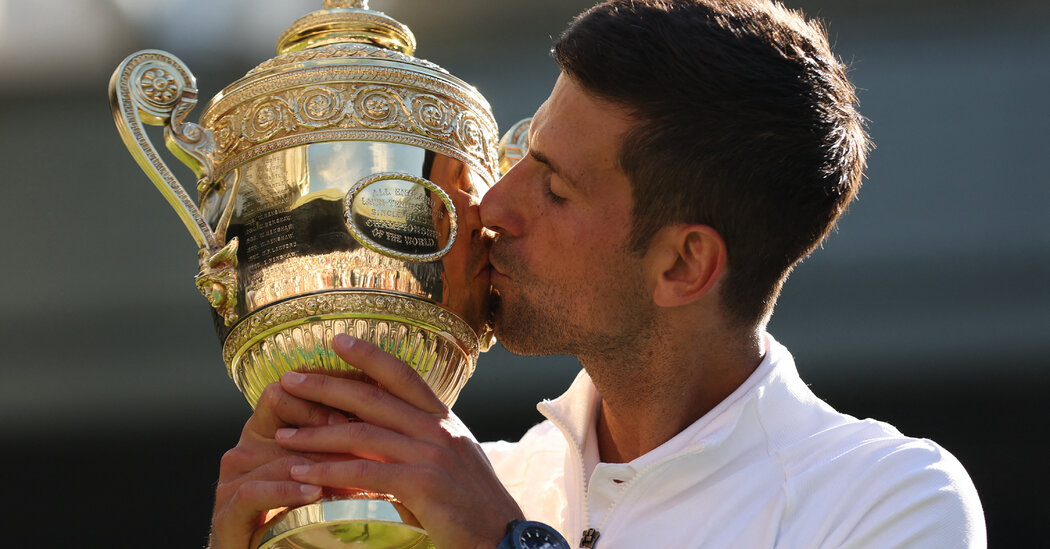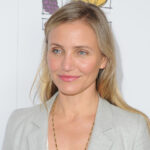
WIMBLEDON, England — The opponents and details change from year to year, but the bottom line has remained the same.
With his trademark steeliness, Novak Djokovic defeated Nick Kyrgios in the men’s final at Wimbledon on Sunday to win his 21st Grand Slam singles title.
Djokovic seized control of the match late in the third set, then used his signature mix of steady power and relentless discipline to keep Kyrgios at bay to win, 4-6, 6-3, 6-4, 7-6 (3), in 3 hours 1 minute.
The victory gave Djokovic his seventh singles title at Wimbledon and his fourth in a row. He secured the trophy he cherishes more than any other with his 28th consecutive match win at Wimbledon. It was his 32nd Grand Slam final. His record in those finals is now 21-11.
“I’ve lost the words for what this tournament means to me and my family,” he said as he clutched the trophy to his chest.
Kyrgios, playing in his first Grand Slam final, was the better player early, outplaying Djokovic in every facet of the game. But as he so often does, Djokovic eventually figured out the small ways he could get the best of Kyrgios, an often erratic Australian, on those few essential points that decide a tennis match as tight as this one.
The biggest of those came in the fourth-set tiebreaker, as Djokovic, moaning with every shot, battled through the rallies and enticed Kyrgios into four straight errors to take a 6-1 lead.
On his third match point, Djokovic pushed Kyrgios into the back of the court and watched one last backhand hit the net. He raised his arms, and as he has so many times before, took a taste of the Centre Court grass in celebration.
“He’s a bit of a god, I’m not going to lie,” Kyrgios said during the trophy ceremony, wearing a red cap rather than the required all whites in one last jab at authority in a tournament that had felt many of them.
On a warm day and sunny afternoon that felt more like Kyrgios’s home in Canberra than Djokovic’s in Monte Carlo, Centre Court had a tense atmosphere. Two future kings, William, the Duke of Cambridge, and his oldest son, George, sat just above the court in the front row of the royal box, with Kate, the Duchess of Cambridge, the biggest tennis fan and player in the family, on the other side of George.
Early on, Kyrgios did just about everything better than Djokovic. He served harder and more accurately. He mixed spins and speeds and stood tall in the middle of the baseline as Djokovic chased balls left and right and struggled to catch up with Kyrgios’s drop shots.
Kyrgios found his first opening in the fifth game, drawing Djokovic in with a sliced backhand, then passing him down the line for his initial shot at breaking Djokovic’s serve. A Djokovic double fault sent him skipping to his chair for the changeover, and five games later, he clinched the opening set with an ace, one of 30 he managed on the day, compared with 15 for Djokovic.
But then Djokovic began to do what he does better than anyone else, find the slimmest crack and put his opponent on the defensive, no matter what the scoreboard says. A first set has been a learning experience for Djokovic.
He found that crack in the fourth game of the second set. With Kyrgios serving at 1-2, the big Australian got into trouble quickly with a long forehand. Djokovic then unleashed a series of backhands, each one hit a little farther into the court than the last, to get three chances for the service break. When Kyrgios’s forehand ticked the net and dribbled over, Djokovic was ready to pounce.
It is rarely a sudden annihilation. Instead, the pressure mounts with each game. Djokovic’s opponent finds himself under pressure on every serve. It’s 30-30, then deuce, then break point, then another. It’s more of the same in the next game, and eventually it’s all too much.
As the match wore on, Djokovic moved more fluidly across the court, dancing to the ball, pounding it on every stroke and serve, and landing it closer and closer to the lines.
After Kyrgios dropped the third set, he pumped his fist toward his box, trying to reassure his team. He started playing tennis at 7. It took him 20 years to reach this stage, far longer than most thought after he stormed onto the tour as a teenager with his speed and size and talent. Now it was all going in the wrong direction.
To his credit, Kyrgios never did combust. But no matter how hard he ran or served or how sexy some of those curling shots of his might have been, the wails of “Come on, Nick” that echoed across the 100-year-old ground and through the sauced-up crowds on Henman Hill outside Centre Court, were no match for Djokovic’s relentlessness.
In the long history of this tournament, there have been finals matchups with more storied champions and players far more beloved than Djokovic and Kyrgios, but it’s unlikely there has ever been one that presented a greater contrast in styles, both on and off the court, in tennis and life.
Djokovic, 35, entered the match second only to Rafael Nadal in Grand Slam singles titles.
Kyrgios, 27, had never even made a Grand Slam semifinal until last week. He still has not played in one because Nadal withdrew from the tournament with an abdominal tear on the eve of their match.
“I slept terribly again last night,” Kyrgios said.
Djokovic, ranked third, is the ultimate counterpuncher, the greatest returner of serve to pick up a racket. He plays in collared Lacoste shirts and has chased tennis immortality with singular determination since he was a small boy in Serbia.
Kyrgios, ranked 40th, plays in basketball tank tops and brings a rare mix of power and hands capable of turning a forehand blasted at his groin into a willowy drop volley. But he has also proven as fragile as any elite player, prone to erupt at an official, opponent or fan in the most vile manner or to smash rackets at any moment. Kyrgios earned $18,000 in fines in this tournament, for spitting at a fan and using obscenities in a third-round match and on Sunday.
On Tuesday, news broke that Kyrgios was due in court on Aug. 2 to face allegations of assaulting a former girlfriend. Chiara Passari told the police Kyrgios grabbed her during a domestic dispute in December. On the advice of his lawyers, Kyrgios has declined to comment on the allegations.
Kyrgios has long had an ambivalent relationship with tennis, playing a handful of tournaments, then disappearing from the tour for months, unable to cope with life constantly on the road.
Until recently, he and Djokovic despised each other, trading insults in news conferences and on social media about Djokovic’s lax approach to the pandemic. Djokovic has refused to be vaccinated and held a tennis exhibition in the spring of 2020 during which several top players contracted the coronavirus.
They are friendlier now, after Kyrgios voiced support of Djokovic after his detainment in Australia in January over his refusal to get vaccinated ahead of traveling to the country for the Australian Open.
During Sunday’s trophy ceremony, after Djokovic complimented Kyrgios on his performance, he joked that he never thought he would be saying so many nice things about his opponent.
Djokovic dropped some sets on the way to the final and had to come back from two sets down in his quarterfinal. But his destiny at this tournament was rarely in doubt. In the fifth set of that quarterfinal, he stretched for a backhand and ended up sprawled on the grass in a Superman pose, a shot that highlight reels will be showing for decades. He played Superman again Sunday.
It may be the last Grand Slam event highlight for a while. Unless there is a policy shift or he changes his stance on getting vaccinated, he will not be able to enter the United States to play in the U.S. Open.
U.S. rules require all foreigners entering the country to be vaccinated against Covid-19. Djokovic has said he believes that individuals should be allowed to choose whether to do so without pressure from governments.
Also, because he was deported from Australia, Djokovic would need a special exemption to return to that country to compete in the Australian Open in January.
Given that, Sunday might have been his last chance to win a Grand Slam event until next May at the French Open in Paris. He made the most of it. He usually does.




